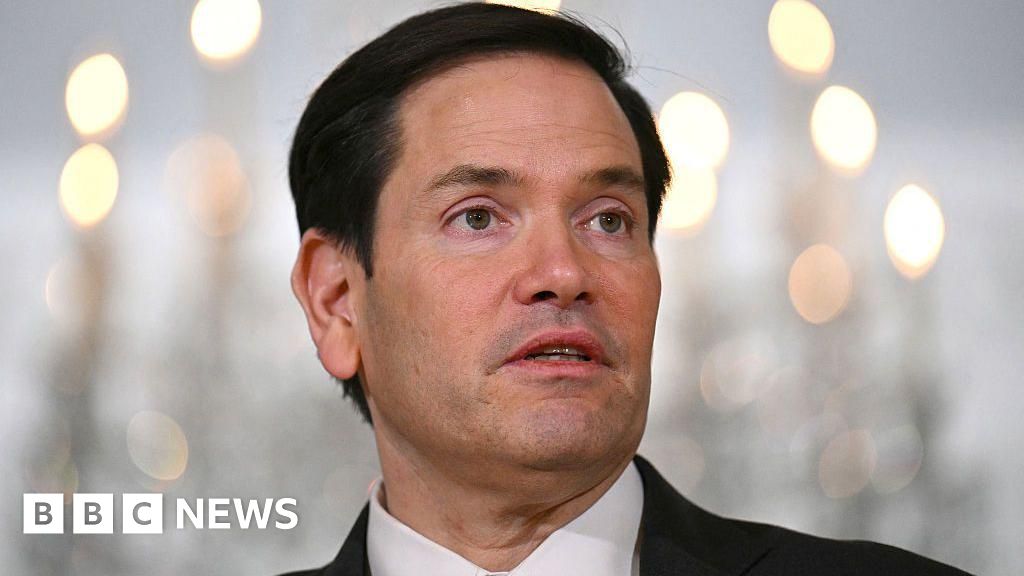US Secretary of State Marco Rubio has called on China to prevent Iran from closing the Strait of Hormuz, one of the world's most important shipping routes. His comments came after Iran's state-run Press TV reported that parliament had approved a plan to close the Strait but added that the final decision lies with the Supreme National Security Council. Any disruption to the supply of oil would have profound consequences for the economy. China in particular is the world's largest buyer of Iranian oil and has a close relationship with Tehran. Oil prices surged following the US attack on Iranian nuclear sites, with the price of the benchmark Brent crude reaching its highest level in five months. "I encourage the Chinese government in Beijing to call them (Iran) about that, because they heavily depend on the Straits of Hormuz for their oil," Marco Rubio had said in an interview with Fox News on Sunday. "If they [close the Straits]... it will be economic suicide for them. And we retain options to deal with that, but other countries should be looking at that as well. It would hurt other countries' economies a lot worse than ours." Around 20% of the world's oil passes through the Strait of Hormuz, with major oil and gas producers in the Middle East using the waterway to transport energy from the region. Any attempt to disrupt operations in the Strait could could send global oil prices skyrocketing. They jumped to their highest since January, with the price of Brent crude reaching $78.89 a barrel as of 23:22 GMT Sunday. "The US is now positioned with an overwhelming defence posture in the region to be prepared for any Iran counter attacks. But the risk for oil prices is the situation could escalate severely further," said Saul Kavonic, Head of Energy Research at MST Financial. The cost of crude oil affects everything from how much it costs to fill up your car to the price of food at the supermarket. China in particular buys more oil from Iran than any other nation - with its oil imports from Iran surpassing 1.8 million barrels per day last month, according to data by ship tracking firm Vortexa. Other major Asian economies including India, Japan and South Korea also rely heavily on crude oil that passes through the Strait. Energy analyst Vandana Hari has said Iran has "little to gain and too much to lose" from closing the Strait. "Iran risks turning its oil and gas producing neighbours in the Gulf into enemies and invoking the ire of its key market China by disrupting traffic in the Strait", Hari told BBC News. The US joined the conflict between Iran and Israel over the weekend, with President Donald Trump saying Washington had "obliterated" Tehran's key nuclear sites. However, it's not clear how much damage the strikes inflicted, with the UN's nuclear watchdog saying it was unable to assess the damage at the heavily fortified Fordo underground nuclear site. Iran has said there was only minor damage to Fordo. Trump also warned Iran that they would face "far worse" future attacks if they did not abandon their nuclear programme. On Monday, Beijing said the US strikes had damaged Washington's credibility and called for an immediate ceasefire. China's UN Ambassador Fu Cong said all parties should restrain "the impulse of force... and adding fuel to the fire", according to a state-run CCTV report. In an editorial, Beijing's state newspaper Global Times also said US involvement in Iran "had further complicated and destabilised the Middle East situation" and that it was pushing the conflict to an "uncontrollable state".
US asks China to stop Iran from closing Strait of Hormuz
TruthLens AI Suggested Headline:
"US Urges China to Prevent Iran from Closing Strait of Hormuz"
TruthLens AI Summary
US Secretary of State Marco Rubio has urged China to intervene and prevent Iran from potentially closing the Strait of Hormuz, a critical maritime route for global oil transportation. This call to action follows reports from Iran's state-run Press TV, which stated that the Iranian parliament has approved a plan for closing the Strait, although the final decision rests with the Supreme National Security Council. Rubio emphasized the economic ramifications of such a closure, noting that it would significantly impact oil supplies and lead to soaring oil prices, with Brent crude already reaching its highest price in five months. He pointed out that China, as the largest importer of Iranian oil, has a vested interest in ensuring the Strait remains open, as any disruption would not only harm Iran but also have severe consequences for the economies of other nations reliant on oil exports from the region.
The importance of the Strait of Hormuz cannot be overstated, as it serves as a passage for approximately 20% of the world’s oil supply. Disruptions in this vital waterway could trigger a dramatic increase in global oil prices, affecting everything from consumer fuel costs to grocery prices. Energy analysts have expressed skepticism about Iran's motivations, indicating that closing the Strait could alienate its neighboring oil-producing countries and jeopardize its relationship with China. The recent escalation in tensions, including US military actions against Iranian nuclear sites, has further complicated the situation. China's response has been critical of US involvement, suggesting it undermines Washington's credibility and exacerbates instability in the Middle East. As the geopolitical landscape evolves, the implications of Iran's actions and the international community's responses remain a focal point of concern for global energy markets and regional security.
TruthLens AI Analysis
You need to be a member to generate the AI analysis for this article.
Log In to Generate AnalysisNot a member yet? Register for free.
